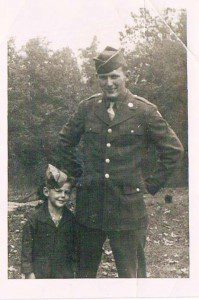
My cousin J. Paul Mace died a few weeks ago and I never told him a truth: he was one of my heroes. Why didn’t I just tell him? Partly, the song Wind Beneath My Wings ruined that truth for my generation by making saying it feel . . . wrong or forced or trite or cheesy. If everyone is your hero, then nobody is your hero. But he was one of my heroes, a polestar that I followed for what it meant to be a man and used in my thinking as recently as when I gave the commencement address at the Rivendell Institute in April.
I don’t know why I did not tell him. Partly, I did not say it because we did not see each other often and when we did, the older folk spoke (blessed talk!) and I listened. More especially, because men of his generation did not think of themselves as heroes or particularly care to be told they were heroes. I don’t know why.
But he was my hero and as the generation passes of which he was not the least member, I want to honor him as I can. This post can be seen as the portrait of an artist as a young man in West Virginia. This sort of creative type volunteered for the Air Force, got rejected for health reasons, ended up drafted and finally a member of the 101st Airborne. “When things got hot, they didn’t care whether you had bad teeth or not.”
He landed in Normandy on D-Day. Paul sat on the landing craft giving a play-by-play to his comrades until the fire got too hot. They hit the beach, the craft opened, and the captain turned and said, “Follow me boys!” Their brave leader stepped into the water, dropped, and was never seen again. Cousin Paul made it to the beach and with the rest of the survivors broke Fortress Europe.
Hitler was doomed, but he did not know it yet.
They sent him to a glider unit and gave him fifteen minutes of training before sending him forward far ahead of General Patton. They fought and waited until the rest of the Armed Forces caught up to them, but the worst was still coming for cousin Paul. Hitler, delusional in his bunker, decided to repeat his great victory in the West by attacking the allies. He took all the reserves he had left and hurtled them at an Allied line grown (perhaps) a bit complacent in victories. The Allied line bulged but did not break and the last fascist offensive of the War was done.
Except Paul Mace had been captured and marched to Stalag B. They were starved and marched (he thought) seven hundred miles in two months. There was almost no food, boxcar trips with no sanitation, and dead POWs by the road to remind Mace of what happened if he stole food. Break for a garden and you ended up shot in the back like a buddy was. His closest call went this way:
“The Germans had us locked in a barn. I heard a hen cackle and reached through the wall past some loose board to get the egg. We were starving. A guard caught me and marched me outside with my hands clasped behind my head. He had already shot three GIs that day, two for stealing and one for trying to escape. Lucky for me I had a friend who could speak German and he talked the guard out of shooting me too. The lesson wasn’t lost. As they marched us through the French countryside there was always a wagon with dead GIs as a sign to us.”
But, of course, Paul Mace did escape. He ran with some buddies and made it back to American lines. There some former prisoners died from overeating. Cousin Paul did not have to worry: he had lost forty-five pounds and could not keep food down. Because this was the greatest generation, they got him well and shipped him west to prepare for the invasion of Japan. The atom bomb ended that worry and he went home to almost Heaven: West Virginia. I haven’t told you most of what he did and experienced, but who could?
Mace believed the powers of his mother’s prayers helped bring him home and those prayers did. All mothers’ prayers like that one are answered and all those boys went home, though not always in the ways we wished. Mace’s mother prayed him home to West Virginia, but those prayers have never stopped working. He left the war and was able to create art in the window displays of an elegant department store in downtown Charleston. His mother went to Heaven (no more almost) and he kept creating beauty and her prayers kept working.
He is home for good and all now, mother’s prayers have been fully answered at last, but his memory remains to us: he was a hero.
~~~~~
I am most thankful for the book Elk River Communities, Kanawha County, 1993. Larry Maynor did us all a favor and interviewed Mace on pages 39-42 in the Elk River section.











